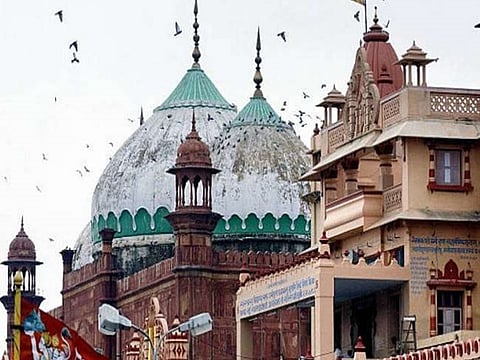Hearing Of Civil Suits Filed Against Mathura Shri Krishna Janmabhoomi Katra Keshav Dev's Land Held In Allahabad HC
Prayagraj, April 16 (TNA) Hearing continued on Tuesday in the Allahabad High Court on the maintainability of civil suits filed against Mathura Shri Krishna Janmabhoomi Katra Keshav Dev's land and other demands including removal of illegal encroachment of Shahi Idgah Mosque. The single bench of Justice Mayank Kumar Jain is hearing 18 civil suits including that of Lord Shri Krishna Virajman Katra Keshav Dev.
On Tuesday, a hearing of about 4 hours took place in the case on which suit number 1 was argued by the Hindu side. Now the next hearing in this case will be held on April 22 at 11.30 am. After the completion of the hearing of the mosque side on the objection filed under Order 7 Rule 11 of CPC on the maintainability of the suit, the advocate of the temple side Vishnu Shankar Jain started the debate today.
Vishnu Shankar Jain said in the court that declaring Waqf property does not make the property theirs and the Waqf Act applies only to Waqf Board, Mutawalli and the Muslim community. This will not apply to non-Muslim communities. The issued list of Waqf is binding only on the Muslim community and not on other communities.
All the cases are being heard together. Even if the site is a protected heritage, the religious character of the site will be determined. The hearing is going on and now further hearing in this case will be held on April 22 from 11.30 am.
Therefore, civil suit is not barred by the Waqf Act. Hindu side's advocate Vishnu Jain cited the Gyanvapi case and Shri Ram Janmabhoomi case in the court, in which it is clearly stated that property is vested in the idol. There cannot be Waqf on that property. Any notification issued under the Waqf Act will not apply to non-Muslims. It will be effective only on Muslims.
Jain argued in the court that the Waqf Tribunal does not have the right to decide the demand of the civil suit and the Supreme Court has said that the civil suit regarding fundamental rights is maintainable. Places in the matter of deciding the right of worship, the religious character of the place The Worship Act is not a hindrance. The religious character of the property can be decided only in a civil suit for which it is necessary to consider documents and oral evidence.
On behalf of the Hindu side, it was said in the court that the notification issued on 25 November 1920 was in favour of the temple, in which it has been said that the Keshav Dev temple was demolished and the mosque was constructed.
On the protected heritage issue, Advocate Jain said that the government is the custodian, not the owner of the property. An SI has also been made a party in a civil suit.

